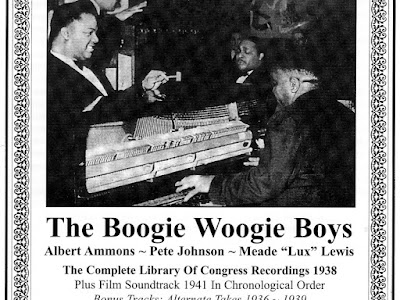 |
| A glimpse ahead...and mind the names. |
With boogie-woogie, we finally have a genre with a fairly specific origin story. Most sources name north Texas as the birthplace, with Marshall, Texas as the specific locale and the lumber/turpentine camps on the Texas/Louisiana border as petri-dish of its evolution. With those camps situated near the lumber - aka, the middle of nowhere - the men they employed left their homes to work in the camps. As noted in a short 1986 history on an old UK program called South Bank Show, they spent long days alternating between working lumber and turpentine. They needed to unwind after they knocked off work, so juke joints and barrel houses popped up near the camps to serve the familiar entertainment of dancing and drinking. It moved on from those hard-scabble beginnings in no time: some of the blues greats like Blind Lemon Jefferson, Jelly Roll Morton and Lead Belly, recall hearing it in the various joints and venues they played.
A second factor, and one often cited as an inspiration for the sound, was the introduction of the railroad to northeast Texas shortly after the Civil War. Marshall was the hub for a semi-independent railroad system (you keep doing you, Texas) that came up by way of New Orleans and reached out into the lumber region known as Piney Woods. As the rails grew to service not just the lumber industry, but also oil and cattle industry, traveling boogie-woogie musicians would hop trains from one camp to the next, spreading the boogie-woogie style as they went. As the rails expanded, they carried it to east Texas’ major cities - e.g., Dallas, Houston and Galveston, places where it was also known as “fast western” - and from there to New Orleans (where, incidentally, a different sub-genre took root) and later to north to Chicago.
The theory goes that the anchor of the boogie-woogie sound - a left-hand bass figure, per Wikipedia’s entry, “’eight to the bar’…much of it written in common time (4/4) using eighth notes” and an original standard chord progression of I-IV-V-I (later with “many formal variations”) - got its inspiration from the steady rocking of the trains moving through that country. Many of those “formal variations have names - e.g., “the Marshall,” a simple form named for the city, “the Jefferson," also four-beats-to-the-bar, but goes down a pitch on the last note in each four note cycle,” or other like “the Rocks” or “the Five.” Whatever the variation, that grounded, rhythmic and repetitive bass-line made boogie-woogie ideal for popular (as opposed to formalized) dancing; boogie-woogie is the blues when it wants to get up and dance, basically. As it moved into the cities, the genre became popular for house-rent parties - i.e., parties where guests paid a small fee to get in and the musician(s) and hosts split the door money - spreading its popularity further still.
A second factor, and one often cited as an inspiration for the sound, was the introduction of the railroad to northeast Texas shortly after the Civil War. Marshall was the hub for a semi-independent railroad system (you keep doing you, Texas) that came up by way of New Orleans and reached out into the lumber region known as Piney Woods. As the rails grew to service not just the lumber industry, but also oil and cattle industry, traveling boogie-woogie musicians would hop trains from one camp to the next, spreading the boogie-woogie style as they went. As the rails expanded, they carried it to east Texas’ major cities - e.g., Dallas, Houston and Galveston, places where it was also known as “fast western” - and from there to New Orleans (where, incidentally, a different sub-genre took root) and later to north to Chicago.
The theory goes that the anchor of the boogie-woogie sound - a left-hand bass figure, per Wikipedia’s entry, “’eight to the bar’…much of it written in common time (4/4) using eighth notes” and an original standard chord progression of I-IV-V-I (later with “many formal variations”) - got its inspiration from the steady rocking of the trains moving through that country. Many of those “formal variations have names - e.g., “the Marshall,” a simple form named for the city, “the Jefferson," also four-beats-to-the-bar, but goes down a pitch on the last note in each four note cycle,” or other like “the Rocks” or “the Five.” Whatever the variation, that grounded, rhythmic and repetitive bass-line made boogie-woogie ideal for popular (as opposed to formalized) dancing; boogie-woogie is the blues when it wants to get up and dance, basically. As it moved into the cities, the genre became popular for house-rent parties - i.e., parties where guests paid a small fee to get in and the musician(s) and hosts split the door money - spreading its popularity further still.